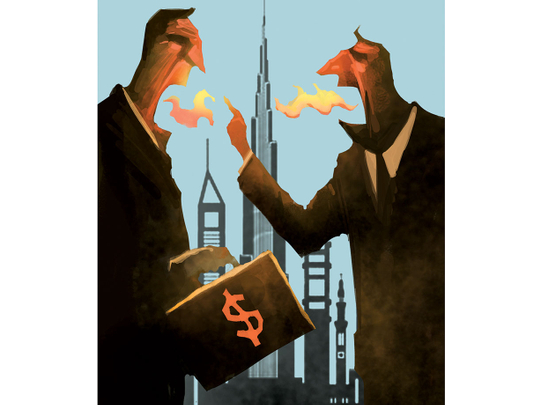
As economies grow and the world seems to get smaller, disputes are increasingly seen as an unavoidable consequence of doing business. When agreements are signed, both parties are understandably optimistic and focus more on “what will go right?” rather than mitigating “what might go wrong?”.
In the Middle East, where there is a great deal of opportunity, it is not uncommon for partners to sign rudimentary agreements that have not undergone a meaningful legal review. These rudimentary agreements may not reflect a clear “meeting of minds”, which is why they sometimes later result in dispute.
While legal reviews are often necessary and helpful in ensuring that an agreement is worded carefully and purposefully, jurisdiction, local law and enforceability also impact clarity between two parties.
While there is no such thing as a typical dispute, real estate and regional joint investments are seeing increasing numbers of disagreements. Historically, real estate in the region has been volatile which often leads to disputes. Real estate investments — like any other — are made with the expectation that values will rise.
When they don’t, as they didn’t in 2008 and 2009, losses result and disputes are born. The current landscape, with declining oil prices and tightening liquidity, makes it more likely that disputes will occur.
There is no doubt that the UAE has made a name for herself when it comes to real estate. From the iconic Burj Khalifa to the intricate beauty of the Sheikh Zayed Grand Mosque, the UAE has shown the world that imagination has no limits. Unfortunately, with great opportunity also comes risk and the real estate crash in 2008 was an example of what can go wrong.
Investments failed — and disputes soared. Construction disputes, in particular, can be very complex. They often require an extensive, deep analysis of the project schedule to identify which delays should be attributed to which party.
Joint investments are another area where there disputes have increased. When oil prices were closer to $100/barrel, there was increased foreign investment into the region. Foreign individuals and companies saw the UAE as an investment — a market where they could expand their capabilities and increase their global footprint.
Some investors entered into joint venture agreements with individuals and companies already operating in the country — presumably to mitigate the risk of entering a new market which was relatively unknown.
For example, an international construction material manufacturer entered into a joint venture with an investment firm to purchase and operate a manufacturing plant in the UAE. When financial results didn’t hit the expected heights, a dispute arose over the way the plant had been operated.
When faced with a dispute, consider three questions:
Do I need a lawyer?
The first piece of advice we typically give our clients when they approach us with a dispute is very simple: get legal advice. This imperative should ensure your interests are protected and that you have the appropriate advice to navigate through the applicable legal structure.
When should I get help?
Even though this may seem like a straight forward question, the answer is usually not that simple. Engaging legal counsel and accountancy advisers costs money. There is often a tendency to first “evaluate the position” in-house to determine if it makes business sense to proceed.
This often develops into a preliminary analysis, interpreting laws and contracts to come up with ‘the right answer’. It is important to understand that this effort will be done again — as a lawyer or forensic accountant will need to independently evaluate the facts.
Is it worth it?
This is the most important question. Involving your advisers early in the process gives you an unbiased review of the facts, providing you with the information to make this critical decision. Legal advisers can highlight the challenges you will face.
Accountancy advisers can analyse the costs and benefits that will be instrumental in determining the way forward. Your advisers have the chance to get intimately familiar with the facts and information early in the process — which will be invaluable as the dispute processes through its life cycle.
As our world becomes smaller and business becomes more complex, disputes become more intricate and prevalent.
They can’t always be avoided. The onus is on all of us to ensure that we are fully prepared to deal with them.
The writer is Director of KPMG Lower Gulf.












